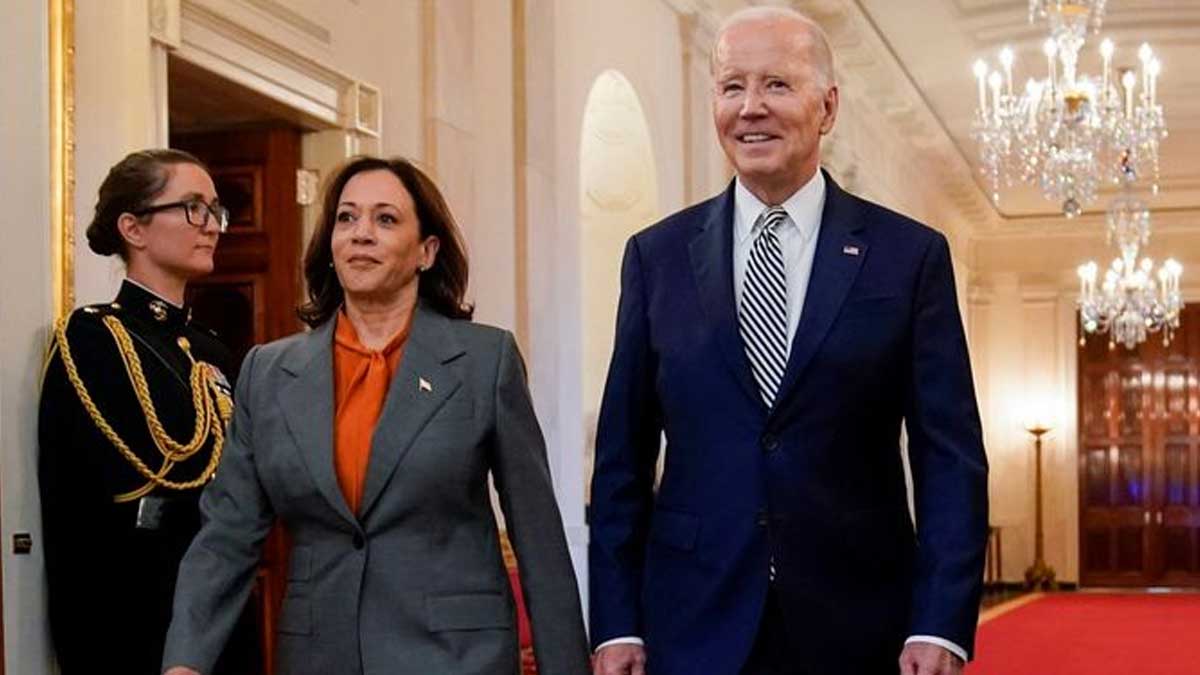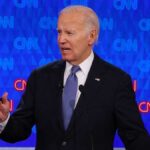- Home
- Billionaires
- Investing Newsletters
- 193CC 1000
- Article Layout 2
- Article Layout 3
- Article Layout 4
- Article Layout 5
- Article Layout 6
- Article Layout 7
- Article Layout 8
- Article Layout 9
- Article Layout 10
- Article Layout 11
- Article Layout 12
- Article Layout 13
- Article Layout 14
- Article Sidebar
- Post Format
- pages
- Archive Layouts
- Post Gallery
- Post Video Background
- Post Review
- Sponsored Post
- Leadership
- Business
- Money
- Small Business
- Innovation
- Shop
Recent Posts
Democrats Consider Kamala Harris to Replace Biden

As President Joe Biden’s support diminishes among congressional Democrats, pundits, and donors, a growing faction within the party is advocating for Vice President Kamala Harris to succeed him. This movement reflects concerns that Biden’s faltering popularity could jeopardize the Democratic party’s chances against former President Donald Trump in the November election. Despite the rising momentum for Harris, current polls indicate that both Harris and Biden are trailing Trump in hypothetical head-to-head matchups.
Rep. James Clyburn of South Carolina, a key Biden ally and former leader in the House Democratic caucus, has expressed his backing for Harris as the Democratic nominee. Although Clyburn has not explicitly called for Biden to step down, he has suggested that the party should rally more robustly behind Harris. In a recent MSNBC interview, Clyburn proposed a “mini primary” as a potential method to determine the party’s nominee, indicating a shift in the party’s approach to selecting a candidate.
Rep. Betty McCollum of Minnesota has publicly joined the ranks of Democrats urging Biden to consider stepping aside. Citing concerns about Biden’s age and cognitive abilities—especially after his recent debate performance—McCollum argues that Harris should be elevated to the presidential nomination. She has suggested that Minnesota Governor Tim Walz would be a strong choice for Harris’s running mate, a proposal highlighted by CNN’s Manu Raju. McCollum’s position reflects broader apprehensions within the party about Biden’s ability to effectively compete in the general election.
Former Rep. Tim Ryan of Ohio has also endorsed Harris as a suitable replacement for Biden. In a Newsweek op-ed, Ryan praised Harris as the Democratic party’s “best path forward,” commending her public address during Biden’s debate as a “ray of light in the darkness.” Ryan criticized those who have questioned Harris’s qualifications in the past, noting that her previous controversies and approval ratings should not overshadow her potential as a candidate. Harris has faced scrutiny over her stances on criminal justice and her perceived lack of popularity.
Senator Peter Welch of Vermont has taken a more direct approach, calling for Biden to withdraw from the race in a Washington Post op-ed. Welch argues that Biden has built a strong lineup of potential candidates capable of defeating Trump. He advocates for Harris as a “capable, proven leader” and suggests that other young, energizing Democratic governors and senators from swing states could also be effective alternatives. Welch’s endorsement aligns with a broader push within the party to explore new leadership options.
House Minority Leader Hakeem Jeffries of New York, while not publicly advocating for Biden’s departure, is reported to privately support Harris as the party’s nominee. Sources close to Jeffries have indicated that he believes Harris represents a promising candidate for the presidency. Meanwhile, Rev. Al Sharpton, a civil rights activist and vocal Biden supporter, has recently expressed support for Harris as a potential nominee. Sharpton has described Harris as a superior choice compared to other names being discussed, emphasizing her qualifications and potential for leadership.
Other Democrats have suggested that Biden step aside with more cautious language, advocating for him to “pass the torch” without specifically endorsing Harris. This group includes prominent figures such as Rep. Adam Schiff of California, Rep. Greg Stanton of Arizona, Rep. Brad Schneider of Illinois, Rep. Hillary Scholten of Michigan, Rep. Brittany Pettersen of Colorado, and Rep. Mike Levin of California. Rep. Pat Ryan of New York has called for Biden to serve as a “bridge to a new generation of leaders,” reflecting a sentiment that values a transition to new leadership while maintaining respect for Biden’s legacy.
Harris has maintained a public stance of support for Biden, even as speculation about her potential candidacy grows. She has not commented on the idea of replacing Biden and has expressed previous interest in the presidency, having run in the 2020 Democratic primary. However, as her polling numbers declined, she exited the race and became Biden’s running mate. Harris’s current position reflects her commitment to the administration, despite the ongoing debate about her potential as a future nominee.
Polling data on Harris’s prospects against Trump reveals a competitive landscape. A CNN/SSRS poll released earlier this month shows Harris trailing Trump by 2 percentage points, with Harris at 45% and Trump at 47%. This is a slight improvement compared to Biden, who trails Trump by 6 points in the same poll. Harris performed better than six other potential Biden alternatives in this hypothetical matchup. In a recent YouGov poll, Harris trailed Trump by 3 percentage points, while Biden was behind by 2 points. An AP-NORC poll shows that approximately 60% of Democrats view Harris as a viable presidential candidate, with only 20% expressing doubts about her capability.
Speculation about potential running mates for Harris includes several high-profile Democrats such as California Governor Gavin Newsom, Colorado Governor Jared Polis, Illinois Governor J.B. Pritzker, and North Carolina Governor Roy Cooper. Newsom has consistently defended Biden and denied any intention to replace him. Other names being considered are Kentucky Governor Andy Beshear, Michigan Governor Gretchen Whitmer, and Pennsylvania Governor Josh Shapiro. These potential picks reflect the broad range of support Harris could draw from within the Democratic party.
Harris’s historical significance as the first female, Black, and South Asian vice president is noted by supporters like Sharpton, who argues that any attempts to push her aside might be motivated by “racist and misogynist” sentiments. Harris’s career includes notable roles as San Francisco’s District Attorney and California’s Attorney General, where she gained prominence for her strong stances against Trump’s policies. Her time in the Senate was marked by rigorous questioning of key figures, such as former Attorney General William Barr and Supreme Court Justice Brett Kavanaugh, further solidifying her reputation as a formidable and influential political leader.
Recent Posts
Categories
- 193cc Digital Assets2
- 5G1
- Aerospace & Defense46
- AI37
- Arts3
- Banking & Insurance11
- Big Data3
- Billionaires449
- Boats & Planes1
- Business328
- Careers13
- Cars & Bikes76
- CEO Network1
- CFO Network17
- CHRO Network1
- CIO Network1
- Cloud10
- CMO Network18
- Commercial Real Estate7
- Consultant1
- Consumer Tech180
- CxO1
- Cybersecurity68
- Dining1
- Diversity, Equity & Inclusion4
- Education7
- Energy8
- Enterprise Tech29
- Events11
- Fintech1
- Food & Drink2
- Franchises1
- Freelance1
- Future Of Work2
- Games141
- GIG1
- Healthcare78
- Hollywood & Entertainment186
- Houses1
- Innovation42
- Investing2
- Investing Newsletters4
- Leadership65
- Lifestyle11
- Manufacturing1
- Markets20
- Media193
- Mobile phone1
- Money13
- Personal Finance2
- Policy567
- Real Estate1
- Research6
- Retail1
- Retirement1
- Small Business1
- SportsMoney33
- Style & Beauty1
- Success Income1
- Taxes2
- Travel10
- Uncategorized8
- Vices1
- Watches & Jewelry2
- world's billionaires418
Related Articles
Trump Moves $4B Stake in Truth Social Parent, Stock Drops 6%
Donald Trump recently transferred his 57% stake in Trump Media & Technology...
By 193cc Agency CouncilDecember 20, 2024House Rejects Trump-Backed Funding Bill, Shutdown Looms
The U.S. House of Representatives rejected a new government funding bill on...
By 193cc Agency CouncilDecember 20, 2024Trump Named Time’s Person of the Year for Second Time
On Thursday, Time magazine honored Donald Trump as its “Person of the...
By 193cc Agency CouncilDecember 12, 2024Meta Donates $1 Million to Trump’s Inaugural Fund
Meta, the parent company of Facebook and Instagram, has confirmed a $1...
By 193cc Agency CouncilDecember 12, 2024















Leave a comment